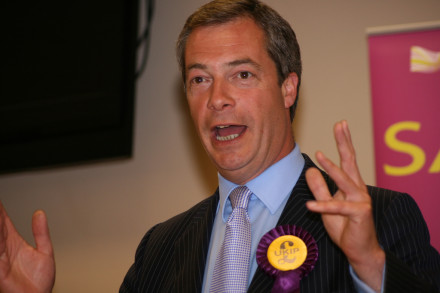
It’s barely three weeks since the independence referendum. But after conference season and two by-elections it already feels a half a lifetime ago. But there are lessons from that campaign against Scottish nationalism that we must not ignore – and they can help in taking on the version of a British nationalism being offered by UKIP.
The first is to understand the scale of anger that real people feel about politics, the political process and political class. It’s as tempting as it is wrong to believe that this is just a crash and crisis caused by post expenses scandal politics. But for many its much deeper than that. The sense amongst many voters is that we all look and sound like each other or worse still we sometimes sound like those bankers who did so much damage in 2008. They also believe that too many of us are straight out of candidate central casting.
Challenging UKIP is complex but there are similarities in how Scottish Labour belatedly came to terms with taking on the SNP. It’s important to recognise that UKIP just like the SNP before them aren’t judged by the same standards as Labour. There’s a different question kicking around in voters minds when their pencil hovers over the UKIP candidate’s name in the privacy of the ballot box. When making a choice about Labour, Tory or coalition Lib Dem candidates people ask ‘Who do I want to govern the country?’ But as their hand moves towards the often unknown UKIP candidate they ask, ‘How do I best punish an establishment who don’t seem to understand me?’
The second lesson from Scotland is that we watched the rise of the SNP and then seemed to look the other way. The appeal of the SNP’s argument wasn’t built in the few weeks of the referendum campaign. In the 1950’s the Nats couldn’t get beyond 1% of the vote and took until the 1970 election to stagger over the 5% line. In 2011 when the SNP won an absolute majority under a PR system in the Scottish Parliament they won despite independence. It was their residual ability to campaign as an anti-establishment government that allowed them to masquerade as insurgent incumbents.
For a quarter of a century too many people in the Scottish Labour Party, including myself, were content to win the votes without always winning the affections of those tempted by nationalism. Not until the referendum did we with our hearts and heads take on the theory and economics of Scotland leaving its most important Union. We allowed them to camp on a politics where they were judged by a different matrix to anyone else. And once that wall was built – what Faisal Islam, Sky’s new political editor, called post-truth politics – it was harder to dislodge them. That’s not a mistake that Labour is going to make on UKIP.
UKIP have come nowhere near to sealing the deal with the voters about the UK removing itself from its most important Union.
I know that Ed Miliband is determined to build on the lessons of Scotland. Of course the SNP and UKIP are different parties but there are similarities in their appeal. Both parties stand on three propositions. Someone from somewhere else is holding you back, if we break free everything will change, and every other politician is a liar, but we’re different.
There’s no overnight quick fix on UKIP. The truth is you can’t ‘deal with’ UKIP in a traditional political fix way; you have to address the anger which leads to decent people voting in frustration for right wing populism. These are people who play by the rules but feel that no matter how hard they try they just don’t get on in life. Part of the answer is about emotional literacy and many of the sensible policies Labour has on work, welfare, crime and immigration. But crucially it’s also about making an argument that in a complicated world the simplicity of the UKIP appeal is also core to their weakness. No real problem facing Britain has a solution as straightforward as UKIP would suggest. They reflect the public’s anger back at them laced with a seductive simplicity. On immigration, crime and public services UKIP are just wrong and in challenging UKIP, Labour won’t morph into an anti-immigration Party. So for Labour winning means making our argument in a confident and consistent way. On tone let’s remain respectful and never shrill about UKIP – they would only thrive as the perceived victims of a ‘Westminster establishment’ pincer movement.
The answer is also about campaigning in a different way with candidates and a Party that spring from the places we seek to represent. That type of politics can be based upon genuine conversations where politicians use their ears before we use our mouths. I tried something a bit different during the Scottish referendum. I got out into the open air for a 100 public street meetings on my Irn-Bru crates. It was unspun and unspinnable – good old fashioned politics. And even to my surprise I enjoyed it more than any political campaign I’ve ever been involved in. We can continue to learn from Arnie Graf’s community organising politics as well as Mike Kane and the Movement for Change campaigning.
A final point is that just as the Tory Party and the political Right are split, Labour shouldn’t follow that apparent fashion. We win together and we lose apart – that’s the lesson of our history. With just over two hundred days until the election let’s get on with things. Listening to the public’s anxieties and demands for change – and then together making it happen.




More from LabourList
Letters to the Editor – week ending 15th February 2026
‘Labour council candidates – it’s tough, but all is not lost’
‘Labour won’t stop the far right by changing leaders — only by proving what the left can deliver’